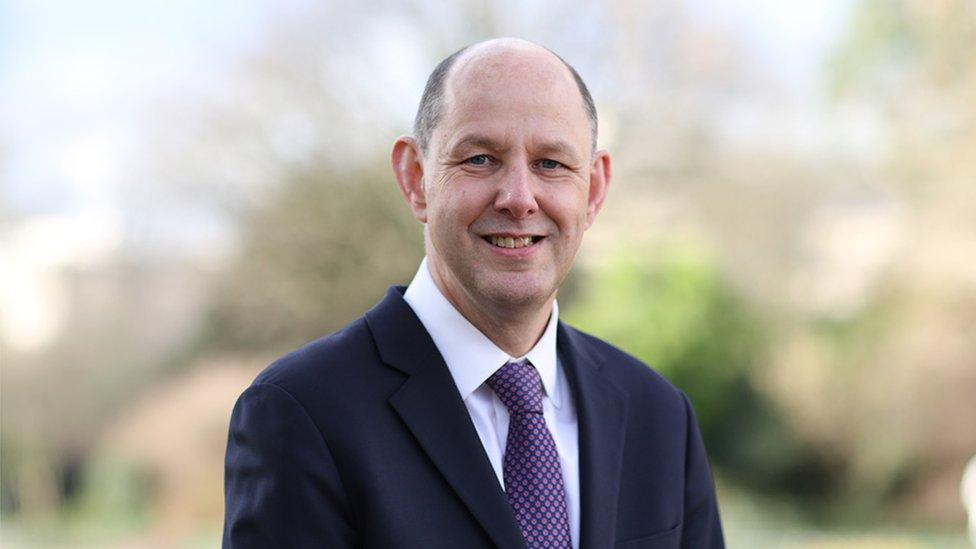Sir Philip Barton named new Foreign Office chief
- Published

Sir Philip Barton currently serves as the UK's High Commissioner in New Dehli
Sir Philip Barton has been named as the top civil servant at the new Foreign, Commonwealth and Development Office.
The UK's High Commissioner to New Delhi will start in the role of permanent secretary on 1 September.
He replaces Sir Simon McDonald, who was asked in June to step down ahead of the merger "at the request" of the PM.
Foreign Secretary, Dominic Raab welcomed Sir Philip to the department, calling him "an outstanding public servant".
Boris Johnson announced in June that he planned to merge the Department for International Development (DfID) - which is responsible for overseas aid - into the Foreign and Commonwealth Office by September.
He told MPs the "long overdue reform" would ensure "maximum value" for taxpayers.
The PM was understood to want someone new in charge of the department, so asked Sir Simon to step down after five years in the role.
Sir Simon said he "fully" respected the decision and the merger was "the right move for our future overseas effort".
But he was one of four senior civil servants to announce their exit from Whitehall in six months amid reports of growing tensions with top members of the No 10 team.
Sir Philip has held a number of public service roles, including as the Foreign Office's as director general, consular and security, and as the acting chair of the Joint Intelligence Committee in the Cabinet Office.
He was also the former High Commissioner to Islamabad, deputy head of mission in Washington, and the director of foreign policy and coordinator for Afghanistan and Pakistan.


Sir Philip Barton has a tough job on his hands as the first permanent secretary of a new Whitehall department - the offspring of an uncomfortable congress between the Foreign Office and the Department for International Development.
He's going to have to stitch together two different organisations with two distinct cultures and two distinct purposes. That is going to require some deft bureaucratic handiwork.
Sir Philip is also taking up the role just as the government carries out a so-called "integrated review" of the UK's foreign policy that his department will be asked to implement.
On paper, Sir Philip has the skill set to deliver on all that - a classic Foreign Office lifer who has had postings all over the world.
He has no direct experience working for DFID, but he was once High Commissioner in Pakistan, which is the biggest recipient of UK foreign aid.
Sir Philip has done his time as a Whitehall warrior, serving as acting chairman of the Joint Intelligence Committee, and as a private secretary in Downing Street for both Sir John Major and Tony Blair.
Intriguingly, not much of his career has involved Europe.
Whitehall sources say Sir Philip is respected as a diplomat and civil servant, and he is well liked, which will be crucial when he tries to bind FCO and DFID staff together.
Others note that his appointment is orthodox and conservative; a safe pair of hands for a tricky bit of government reorganisation.

Sir Philip said he was "delighted" to have been appointed, adding: "I look forward to bringing together our diplomats and development experts to deliver for the people of the UK and act as a force for good around the world."
Mr Raab added: "Philip is well placed to bring together the talent and expertise of both departments while helping combine our foreign and development policy in a way that is innovative, ambitious and more integrated than ever before."